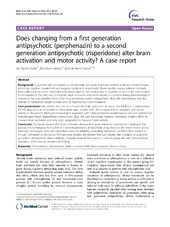Does changing from a first generation antipsychotic (perphenazin) to a second generation antipsychotic (risperidone) alter brain activation and motor activity? A case report
Peer reviewed, Journal article
Published version
Permanent lenke
https://hdl.handle.net/1956/8029Utgivelsesdato
2013-05-06Metadata
Vis full innførselSamlinger
Originalversjon
https://doi.org/10.1186/1756-0500-6-182Sammendrag
Background: In patients with schizophrenia, altered brain activation and motor activity levels are central features, reflecting cognitive impairments and negative symptoms, respectively. Newer studies using nonlinear methods have addressed the severe disturbances in neurocognitive functioning that is regarded as one of the core features of schizophrenia. Our aim was to compare brain activation and motor activity in a patient during pharmacological treatment that was switched from a first- to a second-generation antipsychotic drug. We hypothesised that this change of medication would increase level of responding in both measures. Case presentation: We present the case of a 53-year-old male with onset of severe mental illness in adolescence, ICD-10 diagnosed as schizophrenia of paranoid type, chronic form. We compared brain activation and motor activity in this patient during pharmacological treatment with a first-generation (perphenazin), and later switched to a second-generation (risperidone) antipsychotic drug. We used functional magnetic resonance imaging (fMRI) to measure brain activation and wrist worn actigraphy to measure motor activity. Conclusion: Our study showed that brain activation decreased in areas critical for cognitive functioning in this patient, when changing from a first to a second generation antipsychotic drug. However the mean motor activity level was unchanged, although risperidone reduced variability, particularly short-term variability from minute to minute. Compared to the results from previous studies, the present findings indicate that changing to a second- generation antipsychotic alters variability measures towards that seen in a control group, but with reduced brain activation, which was an unexpected finding.
Utgiver
BioMed CentralTidsskrift
BMC Research NotesOpphavsrett
Jan Berle et al.; licensee BioMed Central Ltd.Copyright 2013 Berle et al.; licensee BioMed Central Ltd.

